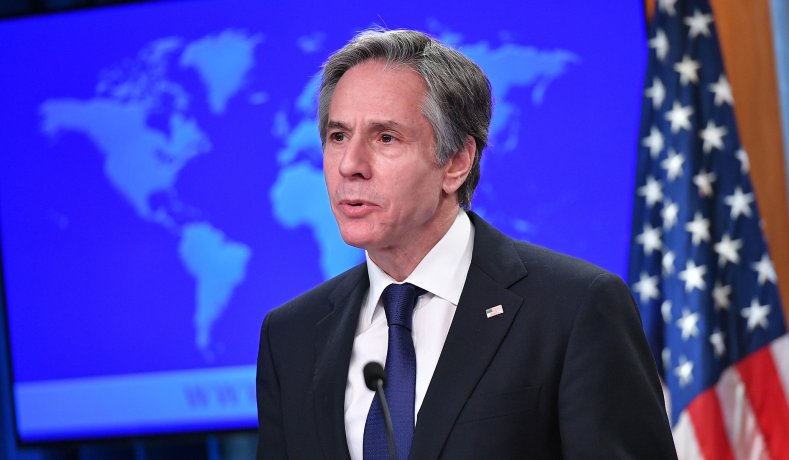U. S Secretary of State Antony Blinken will aim with a trip to the Pacific this week to remind the world that Washington’s strategic long-term focus remains with the Asia-Pacific region despite an escalating crisis with Russia over Ukraine.
Blinken is due to depart on Monday for Australia, Fiji and Hawaii for meetings with key allies and to reaffirm a commitment to push back against what the United States calls China’s growing economic and military “coercion”
Highlights of the week will be a meeting of the informal grouping of Australia, India, Japan and the United States known as the Quad, work to advance diplomatic efforts regarding North Korea and discussions on the concerns over Pacific Islands where U.S officials believe China wants to establish bases.
Blinken’s trip comes days after China and Russia declared a “no limits” strategic partnership at the opening of the Beijing Winter Olympics. The United States is engaged in a diplomatic boycott of the Beijing Olympics.
It marked the most detailed and assertive statement by China and Russia to work together – and against the United States – to build a new international order based on their own interpretations of human rights and democracy.
Daniel Kritenbrink, the State Department’s top diplomat for East Asia, chided Chinese President Xi Jinping during a briefing with journalists ahead of Blinken’s trip, saying Xi’s meeting with Russian President Vladimir Putin on Friday should have been an opportunity to encourage de-escalation of tensions over Ukraine.
China and Russia pledged mutual protection of core interests – an apparent reference to Russia and Ukraine as well as Taiwan, a self-ruled island that Beijing claims as its own. Their joint statement denounced U.S moves to counter China through AUKUS, a pact under which the United States and Britain will provide Australia with nuclear-powered submarines.
Charles Edel, an expert on Asia and Australia at the Centre for Strategic and International Studies think tank, noted that Blinken is traveling to Australia despite the standoff over Ukraine with the Russians and the intense diplomacy among NATO member states.
“His trip underscores just how important – and how challenging – it is for Washington to maintain focus on the Indo-Pacific,” Edel said.
U.S-Chinese ties are at their lowest point in decades as the world’s top two economies disagree over numerous issues including Hong Kong, China’s treatment of ethnic Uyghurs in the Xinjiang region and the South China Sea. Russia’s potential invasion of Ukraine, the most serious threat of a major conflict in Europe since the Cold War’s end, only complicates matters.
During the planned Quad meeting in Melbourne, the four countries are expected to discuss how to further their goals including climate policy and providing COVID-19 vaccines to Southeast Asia ahead of an expected May summit in Japan that President Joe Biden plans to attend.
In meetings with Fiji’s prime minister and Pacific Island leaders, climate policy and Pacific regional security and stability are expected to be front and centrer. Chinese ambitions in the region also will likely come up.
“The speed and extent of China’s outreach to the Pacific Islands has served as a wakeup call,” said Daniel Russel, the top U.S diplomat for East Asia during former President Barack Obama’s administration, who is now with the Asia Society Policy Institute think tank.
Mihai Sora, Research Fellow from Lowy Institute’s Pacific Islands Programme, said though the influence of China in the region will be of key importance for US diplomats, Pacific leaders will have other security concerns.
“What the U.S needs to be aware of is that Pacific Island countries do not automatically see China or closer relations with China as a strategic threat the way the US might or the way the Quad group might like discussing it,” he said.
“It’s also wise for the U.S to include on the agenda items that Pacific countries have identified as priorities for them.”
Sora said security issues like climate change, natural disasters and COVID would be key items that Pacific leaders hope to address during the talks.
Lawmakers from the Pacific Island republic of Kiribati said last year that China has drawn up plans to upgrade an airstrip on one its remote islands about 1,860 miles (3,000 km) from Hawaii. This would offer China a foothold deep in territory firmly aligned with the United States and its allies since World War Two.
The United States has said the AUKUS pact and expanding Quad cooperation show its Indo-Pacific commitment.
But analysts have said that former President Donald Trump’s decision to quit a trade framework now known as the Comprehensive and Progressive Agreement for Trans-Pacific Partnership (CPTPP) continues to undercut U.S engagement with a region where many countries count China as their main trading partner.
“The timing and substance of the QUAD ministerial is driven by the common agenda of the four countries – namely to out-compete China by offering the region real and better alternatives,” Russel said.
Biden told Asian leaders in October that the United States would launch talks a new Indo-Pacific Economic Framework, but few details have emerged and his administration has been reluctant to offer the increased market access Asian countries desire, seeing this as threatening American jobs.
In Hawaii, Blinken will host Japanese and South Korean counterparts. Their discussions are expected to center on North Korea, which has conducted a slew of missile launches this year, raising fears that it may return to testing intercontinental ballistic missiles and nuclear bombs for the first time since 2017.
SOURCE: REUTERS/ PACNEWS














